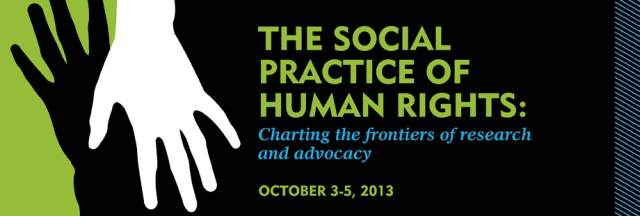Paper/Proposal Title
Why Communication Rights Are Essential to the Protection and Advancement of Human Rights in the 21st Century
Location
River Campus, Room M2225
Start Date
10-4-2013 1:00 PM
Abstract
Communication is an intrinsically fundamental process to our being human. The very defining of our humanity, and our ability to fulfill all of our essential needs and capabilities is dependent upon it. The right to it is recognized as a fundamentally human one in the Universal Declaration of Human Rights, as well as within numerous internationally recognized constitutions and covenants. However, the human rights community - its scholars, practitioners, advocates, and organizations – have devoted insufficient attention to the importance of this process, and its implications for making possible any truly effective progress in the ongoing efforts to advance human rights, not simply in principle, but in practice. Just as issues of labor lay at the center of the struggle for human rights during the age of the Industrial Revolution, in today’s modern mass mediated society, communication and information are integral to this ongoing endeavor. This is because any meaningful protection and exercise of rights within a society are eventually dependent upon power. And as labor defined the agency of that power within the mass industrialized society, in today’s “Information Age,” the revolution in digital media technologies and networked communication systems has made communication and information the defining nexus point for where real power lies, and how it is wielded in society today. The recognition of this by the human rights community, expressed through the coordination of its efforts with the global media democracy movement, is essential to the successful protection and advancement of human rights in the 21st century.
Why Communication Rights Are Essential to the Protection and Advancement of Human Rights in the 21st Century
River Campus, Room M2225
Communication is an intrinsically fundamental process to our being human. The very defining of our humanity, and our ability to fulfill all of our essential needs and capabilities is dependent upon it. The right to it is recognized as a fundamentally human one in the Universal Declaration of Human Rights, as well as within numerous internationally recognized constitutions and covenants. However, the human rights community - its scholars, practitioners, advocates, and organizations – have devoted insufficient attention to the importance of this process, and its implications for making possible any truly effective progress in the ongoing efforts to advance human rights, not simply in principle, but in practice. Just as issues of labor lay at the center of the struggle for human rights during the age of the Industrial Revolution, in today’s modern mass mediated society, communication and information are integral to this ongoing endeavor. This is because any meaningful protection and exercise of rights within a society are eventually dependent upon power. And as labor defined the agency of that power within the mass industrialized society, in today’s “Information Age,” the revolution in digital media technologies and networked communication systems has made communication and information the defining nexus point for where real power lies, and how it is wielded in society today. The recognition of this by the human rights community, expressed through the coordination of its efforts with the global media democracy movement, is essential to the successful protection and advancement of human rights in the 21st century.




Comments
This biennial conference provides a unique space for scholars, practitioners and advocates to engage in collaboration, dialogue and critical analysis of human rights advocacy — locally and globally. Learn more about the Human Rights Center at the University of Dayton >>>.